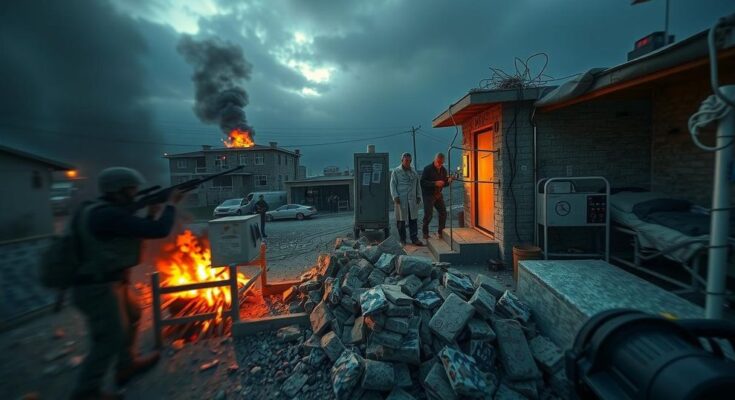Israeli airstrikes in Gaza have intensified, severely impacting the Kamal Adwan Hospital, which struggles to provide care amid a humanitarian crisis. Concurrently, violence escalates in Lebanon with casualties reported among soldiers, leading to governmental complaints against Israel concerning international law violations. The situation remains dire as rescue operations are targeted and healthcare facilities become increasingly compromised.
In Gaza, the Kamal Adwan Hospital is confronting a significant crisis as Israeli airstrikes continue to devastate the area. The hospital’s director described the situation as an “extreme catastrophe,” highlighting the facility’s struggles amidst a dire shortage of medical supplies and equipment, exacerbated by continued bombardment. Reports indicate that violence is escalating not only in Gaza but also in Lebanon, where recent Israeli attacks have resulted in multiple casualties among Lebanese soldiers, leading the Lebanese government to consider a complaint to the United Nations over these assaults. Israeli forces have intensified their operations in the West Bank, particularly in Jenin, resulting in ongoing clashes with Palestinian fighters, alongside alarming accounts of civilian injuries and fatalities. The escalating conflict extends to various neighborhoods of Gaza, including Jabalia al-Balad, contributing to a spiraling death toll. Amid these tensions, rescue operations are stifled as Israeli attacks reportedly target Civil Defence workers who are attempting to aid the wounded in the aftermath of strikes. The humanitarian situation in Gaza is deteriorating as military actions render critical healthcare facilities increasingly incapacitated. Additionally, regional actors, such as Hezbollah, have engaged Israeli forces through missile attacks, modernizing the conflict’s dynamics and contributing to international discourse focused on these escalations. As these events unfold, political ramifications are emerging, particularly in the United States, with Congressional leadership affirming continued support for Israel amidst calls for restrictions on arms sales due to alleged violations of international law.
The ongoing Israeli-Palestinian conflict has witnessed a resurgence in violence, marked by airstrikes in Gaza and retaliatory attacks in southern Lebanon. The humanitarian crisis in Gaza, particularly concerning healthcare access, has reached alarming levels, with hospitals under siege and unable to cater to the growing numbers of casualties. Concurrently, geopolitical implications are surfacing as regional players, such as Hezbollah and the Lebanese government, engage in conflict over territorial integrity and national security, calling upon international bodies to address repeated violations of sovereignty and international laws.
The pervading violence in Gaza and its regional implications highlight a complex geopolitical landscape marked by humanitarian tragedies and escalated military confrontations. As healthcare infrastructure collapses under persistent airstrikes, civilian casualties continue to rise, prompting international outcry and complicating diplomatic efforts. The United States’ response, amidst a backdrop of robust Congressional support for Israel, raises significant questions regarding accountability and the future of peace in the region.
Original Source: www.aljazeera.com




